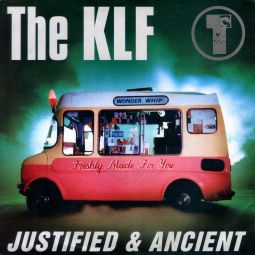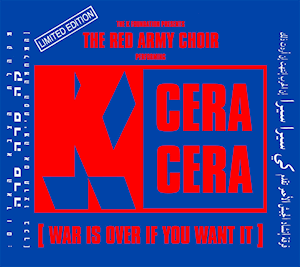James Francis Cauty, also known as Rockman Rock, is an English artist and musician, best known as one-half of the duo the KLF, co-founder of the Orb and as the man who burnt £1 million.

Gerald Rydel Simpson, better known as A Guy Called Gerald, is a British record producer and musician. He was an early member of the electronic group 808 State, contributing to their debut LP Newbuild (1988) and hit single "Pacific State" (1989). He also achieved solo success with his 1988 hit single "Voodoo Ray", which became a touchstone of Manchester's acid house scene and reached No. 12 in the UK charts. He embraced breakbeat production in the 1990s, with his 1995 album Black Secret Technology becoming a "much-touted candidate for 'best jungle album ever.'" He also ran the London-based independent record label Juice Box Records from 1991 to 1998.
Ambient house is a downtempo subgenre of house music that first emerged in the late 1980s, combining elements of acid house and ambient music. The genre developed in chill-out rooms and specialist clubs as part of the UK's dance music scene. It was most prominently pioneered by the Orb and the KLF, along with artists such as Global Communication, Irresistible Force, Youth, and 808 State. The term was used vaguely, and eventually fell out of favor as more specific subgenres were recognized.

"Voodoo Ray" is the debut single by Gerald Simpson, recording under the name A Guy Called Gerald. The single was released in the UK in 1988 on the 7" and 12" vinyl formats, on the Rham! label. A version of the track appeared on A Guy Called Gerald's 1988 album Hot Lemonade, and the original single was later released in the United States in 1989 by Warlock Records.

"Where the Streets Have No Name" is a song by Irish rock band U2. It is the opening track from their 1987 album The Joshua Tree and was released as the album's third single in August 1987. The song's hook is a repeating guitar arpeggio using a delay effect, played during the song's introduction and again at the end. Lead vocalist Bono wrote the lyrics in response to the notion that it is possible to identify a person's religion and income based on the street on which they lived, particularly in Belfast. During the band's difficulties recording the song, producer Brian Eno considered erasing the song's tapes to have them start from scratch.

"It's Grim Up North" is a song by The Justified Ancients of Mu Mu. The song was originally released as a limited edition "Club Mix" in December 1990 with Pete Wylie on vocals. A re-recorded version with Bill Drummond on vocals was released commercially in October 1991. These recordings were the first releases by Drummond and his creative partner Jimmy Cauty under the JAMs moniker since the 1988 compilation album Shag Times, and the last under that name; in the meantime they had operated as the Timelords and the KLF. The 1991 single release reached No. 10 on the UK Singles Chart and entered the top 10 in Denmark and Finland.

"3 a.m. Eternal" is a song by British acid house group the KLF, taken from their fourth and final studio album, The White Room (1991). Numerous versions of the song were released as singles between 1989 and 1992. In January 1991, an acid house pop version of the song became an international top ten hit single, reaching number-one on the UK Singles Chart, number two on the UK Dance Singles Chart and number five on the US Billboard Hot 100, and leading to the KLF becoming the internationally biggest-selling singles band of 1991.

1987 is the debut studio album by British electronic band The Justified Ancients of Mu Mu, later known as the KLF. 1987 was produced using extensive unauthorised samples that plagiarised a wide range of musical works, continuing a theme begun in the JAMs' debut single "All You Need Is Love". These samples provided a deliberately provocative backdrop for beatbox rhythms and cryptic, political raps.

Blast First is a sub label of one-time independent record label Mute Records, founded in approximately 1985. It was named after a phrase taken from the first number of the radical Vorticist journal Blast, published by Wyndham Lewis in 1914. Lewis's "Manifesto" begins with the words "BLAST First ENGLAND".

"Last Train to Trancentral" is a song released, in different mixes, as a series of singles by British electronic band The KLF, including "Last Train to Trancentral ". A commercially successful single of April 1991, it reached number two on the UK Singles Chart, number one on the UK Dance Singles Chart and achieved international top ten placings. It is a central song within The KLF's work, and is distinctive for an uplifting string-synthesiser break.

"What Time Is Love?" is a song released, in different mixes, as a series of singles by the British electronic music band the KLF. It featured prominently and repeatedly in their output from 1988 to 1992 and, under the moniker of 2K, in 1997. In its original form, the track was an instrumental electronic dance anthem; subsequent reworkings, with vocals and additional instrumentation, yielded the international hit singles "What Time Is Love? " (1990), and "America: What Time Is Love?" (1991), which respectively reached number five and number four on the UK Singles Chart, and introduced the KLF to a mainstream international audience.

"Justified & Ancient" is a song by British band the KLF. It was featured on their 1991 album, The White Room, but its origins date back to the duo's debut album, 1987 .

"Doctorin' the Tardis" is a novelty single by the Timelords. The song is predominantly a mash-up of the Doctor Who theme music and Gary Glitter's "Rock and Roll" with sections from "Block Buster!" by The Sweet. The single was not well received by critics but was a commercial success, hitting number one on the UK and New Zealand singles charts, and reaching the top 10 in Australia, Finland, Ireland and Norway.

"K Cera Cera", a presentation of The Red Army Choir by the K Foundation, was released as a limited edition single in Israel and Palestine in November 1993. The song was an amalgam of Jay Livingston/Ray Evans's "Que Sera, Sera " and John Lennon/Yoko Ono's "Happy Xmas ".

"All You Need Is Love" is a song by the Justified Ancients of Mu Mu, independently released as their debut single on 9 March 1987. A politically topical song concerning the British media's AIDS furore, the track was initially given a 12" white label release because of its sampling of other records.

The KLF are a British electronic band who originated in Liverpool and London in the late 1980s. Scottish musician Bill Drummond and English musician Jimmy Cauty began by releasing hip hop-inspired and sample-heavy records as the JAMs. As the Timelords, they recorded the British number-one single "Doctorin' the Tardis", and documented the process of making a hit record in a book The Manual . As the KLF, Drummond and Cauty pioneered stadium house and, with their 1990 LP Chill Out, the ambient house genre. The KLF released a series of international hits on their own KLF Communications record label and became the biggest selling singles act in the world in 1991.

"Fuck the Millennium", sometimes spelled "***k the Millennium", is a protest song by the band 2K—Bill Drummond and Jimmy Cauty—better known as the Justified Ancients of Mu Mu or the KLF. The song was inspired musically by Jeremy Deller's "Acid Brass" project, where a traditional brass band plays acid house classics; these include the KLF's "What Time Is Love?". They were also inspired topically by the then-forthcoming end of the second millennium and the plans to celebrate it.

"Burn the Bastards" is a 1988 song by Bill Drummond and Jimmy Cauty as The Justified Ancients of Mu Mu, from their second, and final before changing names, album Who Killed The JAMs?. The "bastards" of the title are copies of The JAMs first album, 1987 , which Drummond and Cauty burnt on a bonfire in a Swedish field after a copyright dispute with the Swedish pop group ABBA. The song was released as a single, along with a separate single of remixes titled "Burn the Beat". Both singles were credited to The KLF, marking a change of name and with it a change of musical genre, from The JAMs' sample-fuelled political hip-hop to The KLF's upbeat and uptempo house music.
The Fairey Band is a brass band based in Heaton Chapel in Stockport, Greater Manchester. The band has achieved fame in modern music circles with its appearances playing Acid Brass although they still play traditional brass band music and participate each year in the Whit Friday Brass Band contests.















